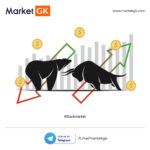Ever wondered what are shares and share markets all about? Let’s learn share market basics in this section. Each and every one of us has defined goals in life and has time limits by which we have to attain these goals. For example, you may plan to study abroad, buy a car, build a home, etc. To achieve these, you need to have a proper financial planning. By this, I mean investing has to become your habit. Financial assets or share markets provide high returns and so start investing at a young age and do it regularly for a long period of time.
You can invest in the share market for short term or long term depending on your needs. Based on your risk appetite, age and dependency, you can be a trader or investor in the share market. As markets are always associated with risk, you have to read carefully. The various investment options in the Indian share market today are equity, mutual funds, SIP, IPO, bonds, debentures, derivatives, commodity, currency, etc.
What is a Stock Exchange ?
A Stock Exchange is a place where the buyer and seller meet to trade in shares in an organized manner. There are at present 25 recognized stock exchanges in the country that are governed by the Securities Contact (Regulation) Act, 1956.
What is an index?
An index is a stock-market indicator created as a statistical measure of the performance of an entire market or segment of a market based on a sample of securities from the market. An index is thus a means to evaluate the overall performance of a market or of a segment of the market. An index measures aggregate market movements. Apart from being a general market indicator, indices are used as a benchmark to evaluate individual portfolio performance. Professional money managers will always try to outperform the market, i.e. they will always try to do better than the indices. For example, if the value of a portfolio moves up by 10% while the index moved up by only 5% then the portfolio is doing better than the market.
We have 2 renowned indices viz.
- BSE Sensitive (BSE Sensex) and
- S&P Nifty 50 (Nifty)
BSE Sensex comprises of 30 large-cap companies. As the name suggests, it is a premier index on Bombay Stock Exchange (BSE).
Nifty comprises of 50 large-cap companies on the National Stock Exchange (NSE).
What is online share trading?
Online share trading is the process of buying and selling of shares through the internet on the secondary market with a view to profiting from the difference in the buying price and selling price. The share price of a stock is determined by the demand and supply of a particular share. Online share trading enjoys various advantages such as accessibility, security, convenience in tracking portfolio etc over traditional branch trading.
What returns can I expect from my investments in equity shares?
The major distinction of Equity investment from all other investment avenues is that while the return from many avenues such as Bank Deposits,Small Saving schemes, Debentures, Bonds etc are fixed and certain, the earnings from equity investments are highly uncertain and varied. A good scrip picked up at the right time could fetch fairly good returns else the return may be meager or it may even turn negative, i.e. the invested fund itself may be eroded. In short, if the investment in fixed income category instruments is secured and risk-free to a large extent, investment in equities and related fields could be termed as risky.
What is Dividend?
Dividend is the part of profit distributed by the company among its investors. It is usually declared as a percentage of the paid-up value or face value of the share.
What is a Bonus Share?
A Share issued by companies to their shareholders free of cost by capitalization of accumulated reserves from the profits earned in the earlier years.
What is a Bond?
A Bond is a promissory note issued by a company or government to its lenders. A Bond is evidence of debt on which the issuing company usually promises to pay the bondholder a specified amount of interest at intervals over a specified length of time, and to repay the original loan on the expiration date. A bond investor lends money to the issuer and in exchange, the issuer promises to repay the loan amount on a specified maturity date.
What Makes Stock Prices Go Up and Down?
There are many factors that determine whether stock prices rise or fall. These include the media, the opinions of well-known investors, natural disasters, political and social unrest, risk, supply and demand, and the lack of or abundance of suitable alternatives. The compilation of these factors, plus all relevant information that has been disseminated, creates a certain type of sentiment (i.e. bullish and bearish) and a corresponding number of buyers and sellers. If there are more sellers than buyers, stock prices will tend to fall. Conversely, when there are more buyers than sellers, stock prices tend to rise.
When is the Best Time to Buy and Sell?
The two most important decisions an investor will make are when to buy and when to sell. The best time to buy is when others are pessimistic. The best time to sell is when others are actively optimistic. When buying, remember that the prospect of a high return is greater if you buy after its price has fallen rather than after it has risen. But caution should be exercised. For example, after the stock of fictitious Company X declined by 30%, 40% or more, the first question to ask is why. Why did the stock fall as it did? Did other stocks in the same industry experience a decline? If so, was it as severe? Did the entire stock market fall? If the broader market or other stocks in the same industry/sector performed relatively well, there may be a problem specific to Company X. It’s best to adopt a buy/sell discipline and adhere to it. Benjamin Graham, the father of value investing, once said, “The buyer of common stocks must assure himself that he is not making his purchase at a time when the general market level is a definitely high one, as judged by established standards of common-stock values.” His reference was to what we discussed as fair value under the section Stock Valuation above.



